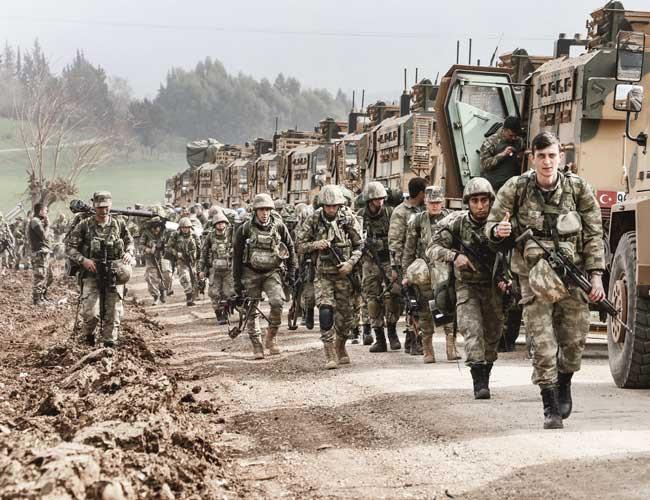Turkey-U.S. to convene a working group to fix bilateral disputes
Sevil Erkuş - ANKARA

A joint mechanism established between Turkey and the U.S. for the resolution of bilateral problems will convene for its first meeting in Washington D.C. on March 8-9, with Syria and Iraq on its agenda.
The meeting aims to solve longstanding problems between the two NATO allies, as conflicting interests have led to a low in bilateral ties.
This is primarily due to disagreements over the former’s support for the YPG as its local partner in Syria in the struggle against the Islamic State of Iraq and the Levant (ISIL). Ties between two NATO allies have also deteriorated because of the U.S.’s harboring of exiled Islamic cleric Fethullah Gülen, whom the Turkish government accuses of masterminding the July 2016 coup attempt.
In the latest round of disputes between Ankara and Washington, Turkey reacted fiercely to U.S. plans to form a border army with the Syrian Democratic Forces (SDF), which is dominated by YPG fighters. Moreover, Ankara voiced its intention to advance its “Operation Olive Branch” from Syria’s Afrin district to the Manbij region in order to sweep out Syrian Kurdish fighters, a move that could potentially risk military confrontation with U.S. troops deployed there.
State Secretary Rex Tillerson has stepped up efforts to restore dialogue with Ankara, paying a visit to the capital last month in a bid to ease tension.
The outcome of his two-day talks with the Turkish leadership was to establish a mechanism between Turkey and the U.S. that would immediately tackle disputed issues through three working groups on the issues of fighting terror in Syria and Iraq, Gülen, the judiciary (including U.S. citizens arrested in Turkey), and the implications of the Turkish government’s purchase of Russian S-400 anti-missile systems.
The first round of meetings on Thursday will focus on Turkey and the U.S.’s different understandings regarding the fight against terrorism in Syria and Iraq. Turkey sees the YPG as an offshoot of outlawed Kurdistan Workers’ Party (PKK) and asks its NATO ally to stop supplying arms to the group and take back any heavy weapons given to them. Ankara also urges the U.S. to keep its promise regarding the YPG’s retreat from the Manbij region to the east of Euphrates River.
Turkey has proposed to Tillerson deploying joint forces in Manbij after the YPG withdraws from the region. In the joint press conference, Tillerson said they “wanted to ensure that the city remained under control of the allied forces and did not fall into the hands of others.”
Turkey has prioritized tackling Manbij, where YPG and U.S. troops have been stationed together, despite promises from Washington to Ankara that they would be withdrawn to the east of the Euphrates.
Ankara sees the issue of Manbij as a test for the U.S.’s resolve to normalize bilateral relations so they can resume cooperating in Syria again. The U.S., for its part, is focused on ways to maintain the security of the Manbij region, which Tillerson has described as “strategic.”
I think our goal is for the U.S. and Turkish governments to reach an agreement on how security can be provided in Manbij. But I cannot predict what the outcome of these discussions will be. “We certainly recognize that Turkey has a legitimate interest in the security infrastructure in northern Syria, which includes Manbij,” a U.S. official earlier told Hürriyet Daily News.
“We remain committed to fulfilling our promises regarding the YPG presence in Manbij. It is a city with a lot of people and somebody has to provide security there but our intention is that will not be the YPG,” he added.
If the U.S. use these talks as a new delaying tactic, of course, it would cause fresh problems, the presidential spokesperson İbrahim Kalın told reporters on March 7. Kalın also urged the U.S. to stop trying to legitimize the People’s Protection Units (YPG) by describing the group’s “terrorists” as generals.
“Calling a member of a terrorist group [a general] means putting that terrorist group in the same category as a legal state,” Kalın stated. He identified the U.S. approach as “scandalous” with regards to the law of nations.
The case is not about “lack of information, but the mentality,” he said, noting that these remarks, which were made just before the meeting of the working group, cast a shadow on the seriousness of the consensus reached between the two countries. He urged the U.S. administration to clarify its position regarding the YPG.
Foreign Minister Mevlüt Çavuşoğlu and his U.S. counterpart are scheduled to meet in Washington on March 19 as part of the new mechanism.
















